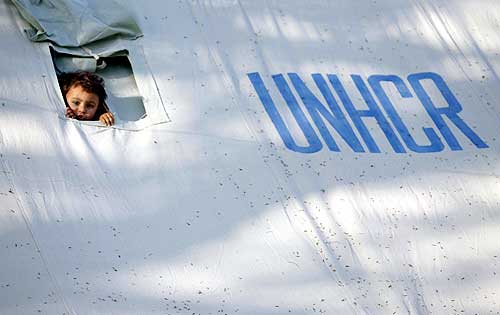Pakistan has agreed in principle to launch a full-fledged military operation against Taliban militants in North Waziristan. But it will be a tough task for the country's army, as the terrain is believed to be the stronghold of numerous Arab, central Asian, Pashtun and Punjabi militants.
The Pakistan government took the decision after United States National Security Adviser General James Jones and Central Intelligence Agency chief Leon Panetta met Pakistani President Asif Ali Zardari, Prime Minister Yusuf Raza Gilani, Foreign Minister Shah Mehmood Qureshi and Chief of the Army Staff General Ashfaq Parvez Kayani in Islamabad last week.
The military operation may increase the flow of US aid to Pakistan, but the consequences might be unaffordable for the beleaguered country. The success of the offensive in North Waziristan will mean the end of the Taliban regime in Pakistan, and the militants will never allow that to happen.
Hafiz Gul Bahadar, chief of Taliban factions in North Waziristan, is one of the most influential commanders in Pakistan, and controls a militia with local and foreign fighters. He has not launched an attack in recent times due to a peace agreement with the government. If the Pakistan authorities decide to break the peace deal and launch an offensive, the powerful Taliban commander can turn Pakistani cities into battlefields. His group is believed to be more powerful than even the Tehreek-e-Taliban Pakistan.
Gul Bahadar has several advantages over the Pakistan army. Not only is his militia well organised, the local tribesmen also support him as they are fed up with the continuous drone strikes in the area.
Al Qaeda and other terror outfits in North Waziristan have always opposed peace deals with the government. An offensive will give them a much-needed excuse to directly fight the Pakistan army, which according to them only tows America's line.
An operation in North Waziristan also means taking on the powerful Haqqani network, which supplies funds to the TTP as well as Bahadar's militia. The Pakistan government has always followed a policy of appeasement with the Haqqani network by turning a blind eye to its activities and patronising it to maintain strategic control in the area.
Pakistan authorities will continue to nurture the Haqqani network as they will need a friendly segment among the Taliban leadership, in case the US decides to strike a peace deal with the 'good Taliban' in Afghanistan.
During the military assault in South Waziristan last year, thousands of TTP militants fled to the north and took refuge there. The top brass of the TTP including chief Hakimullah Mehsud, Qari Hussain, Waliur Rehman, Commander Shamim and Madhu Mehsud are reportedly residing in North Waziristan. They will prove to be formidable adversaries if the army launches an offensive there.
The Punjabi Taliban is also based in North Waziristan and they will support the local militants against the Pakistan army.
Members of militant groups led by Amjad Farooqi, Lashkari Jhangvi and Iliyas Kashmiri have also set up base in North Waziristan.
An offensive in North Waziristan will lead to retaliatory strikes by the militants, who may launch another series of suicide bombings across Pakistan's major cities.
Last year, when the army launched an offensive in South Waziristan, the militants hit back by carrying out a series of suicide attacks in Peshawar, Lahore, Bannu and Dera Ismail.
To add to the woes of the Pakistan army, the TTP claims to have 2,800 trained suicide bombers while the Haqqani network 'specialises' in suicide car bombings.
The army also has to contend with Mullah Nazir, the head of all Taliban militants from the Waziri tribe, who had formed the Shura Ittihad-ul-Mujahedeen with the late Beitullah Mehsud and Hafiz Gul Bahadar in 2009.
Since Pakistan cannot afford to launch a real and full-fledged operation in North Waziristan, it might undertake an 'eyewash' operation to placate the US administration.











 © 2025
© 2025